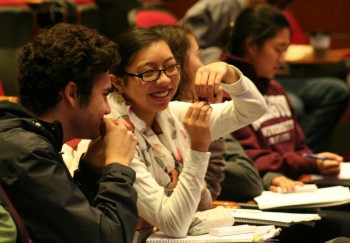Do students who use a rule-based approach to learning outperform rote-based learners in General Chemistry and other STEM courses that encourage creative problem solving and integration of complex concepts?
In an ongoing research program, Gina Frey (CIRCLE and Chemistry) and Mark McDaniel (CIRCLE and Psychology), have been identifying students’ concept-building approaches (rote or rule-based) with an online function learning task, to examine the association between concept-building approach and performance in General Chemistry.
Project Overview
 We believe that one reason many talented students struggle and eventually migrate out of STEM fields is that they use a concept-building approach that is not compatible with the creative problem solving and integration of complex concepts necessary for success in many STEM fields. Basic cognitive psychology research (McDaniel, Cahill, Robbins, & Wiener, 2014) has identified stable tendencies for individuals to approach concept-learning tasks by either memorizing examples and features (rote-based learning) or by extracting rule-based information from examples (rule-based learning). Rule-based learners are able to use extracted rules and apply them to new problems and situations, whereas rote-based learners struggle to solve problems that are substantially different than those they have learned before.
We believe that one reason many talented students struggle and eventually migrate out of STEM fields is that they use a concept-building approach that is not compatible with the creative problem solving and integration of complex concepts necessary for success in many STEM fields. Basic cognitive psychology research (McDaniel, Cahill, Robbins, & Wiener, 2014) has identified stable tendencies for individuals to approach concept-learning tasks by either memorizing examples and features (rote-based learning) or by extracting rule-based information from examples (rule-based learning). Rule-based learners are able to use extracted rules and apply them to new problems and situations, whereas rote-based learners struggle to solve problems that are substantially different than those they have learned before.
In our research to date, we have identified approximately equal numbers of rote and rule-based learners and found that rule-based learners generally outperform rote-based learners in General Chemistry at Washington University and six collaborating institutions, with advantages ranging from about 3% to 9%. Further, when examining performance in a more fine-grained way, we find equivalent performance across concept-building approaches on near transfer problems—problems that are structurally similar to problems seen in class, homework or problem sets. The significant advantage of rule-based learners only emerged on far transfer problems, which require novel solution methods or integration across concepts (McDaniel et al., 2018).
Finally, at Washington University, we have tracked students into their second year to measure the influence of concept-building approach in organic chemistry and found an 11% advantage for rule-based learners over rote learners in overall exam performance (Frey, Cahill, & McDaniel, 2017).
 Currently, we are expanding our research into other STEM disciplines, such as biology and physics, at the University. We also plan to bring the project to a wider range of institutions. Second, in addition to examining performance data, our future studies will directly examine how concept-building approach relates to specific learning strategies, study habits, and other measures of concept-learning and problem-solving. Finally, we will work to develop interventions that can move students toward rule-based learning or otherwise provide rote learners with strategies that can boost their performance to the level of rule-based learners.
Currently, we are expanding our research into other STEM disciplines, such as biology and physics, at the University. We also plan to bring the project to a wider range of institutions. Second, in addition to examining performance data, our future studies will directly examine how concept-building approach relates to specific learning strategies, study habits, and other measures of concept-learning and problem-solving. Finally, we will work to develop interventions that can move students toward rule-based learning or otherwise provide rote learners with strategies that can boost their performance to the level of rule-based learners.
Collaborators
- Marty Perry (Associate Professor, Chemistry, St. Louis College of Pharmacy)
- Diane Bunce (Professor Emerita, Catholic University of America)
- Paula Lemons (Associate Professor, Biochemistry and Molecular Biology, University of Georgia)
- Cheryl Sensibaugh (Postdoctoral Research Associate, Biochemistry and Molecular Biology, University of Georgia
- Erin Dolan (Professor, Biochemistry and Molecular Biology, University of Georgia)
Funding
This project has been supported by a four-year grant from the Henry Luce Foundation and a two-year grant from the Teagle Foundation.
References
McDaniel, M. A., Cahill M.J., Robbins, M., Wiener, C. (2014). Individual differences in learning and transfer: Stable tendencies for learning exemplars versus abstracting rules. Journal of Experimental Psychology: General, Vol 143(2), 668-693.
Frey, R. F., Cahill, M. J., McDaniel, M. A. (2017). Students’ concept-building approaches: A novel predictor of success in chemistry courses. Journal of Chemical Education, Vol 94(9), 1185-1194.
McDaniel, M. A., Cahill, M. J., Frey, R. F., Rauch, M., Doele, J., Ruvolo, D., Daschbach, M. M. (Feb. 2018, Online First). Individuals differences in learning exemplars versus abstracting rules: Associations with exam performance in college science. Journal of Applied Research in Memory and Cognition.